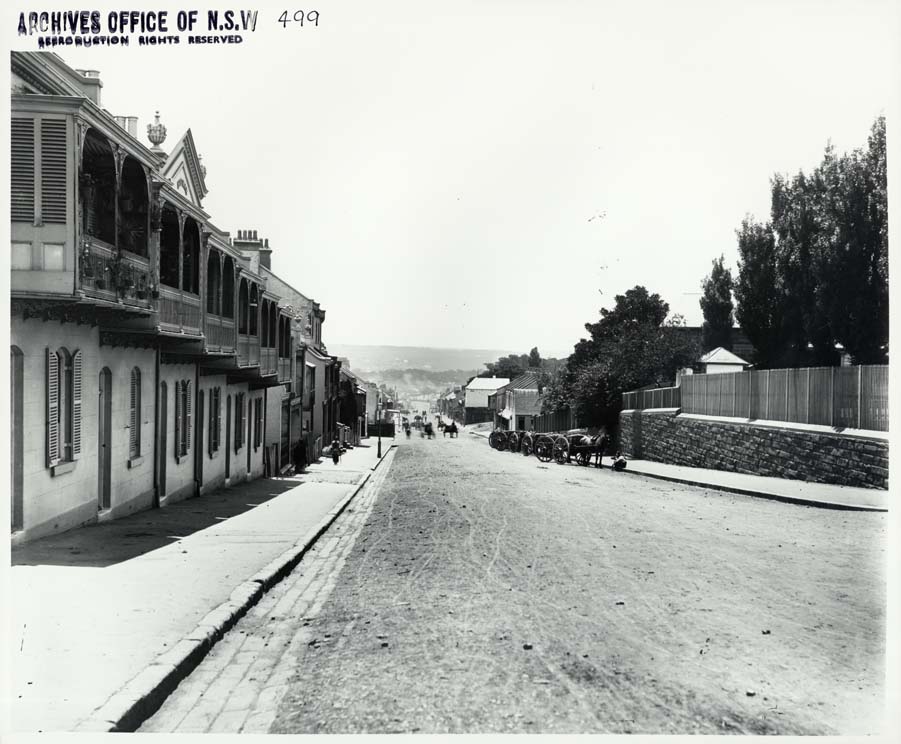Here is a doubly mysterious image…… An unidentified street in Sydney (NSW) and no date!
Can you date this photograph?
We have many other undated photographs in Photo Investigator and on our Flickr account. If know the dates or any other interesting facts about these images please let us know.
Category: -- Can you date...?
Tag: Moments in Time


beachcomberaustralia says:
[Hint – It’s not the back-of-Bourke!]
pellethepoet says:
[Yep, not the back – it’s the front!]
Fiona Sullivan says:
Ruh-roh. It never ends well for us when @beachcomberaustralia and @pellethepoet start joking around lol. Is it time for another one of these? http://www.youtube.com/watch?v=DJ5r3oNFVeE
JennysOldCars says:
No cars! But that’s a clue in itself as there’s no car tyre tracks….yes I know the early cars had really skinny tyres but the tracks on the roadway would have to have been made by a really erratic early car driver as the tiller steering on those vehicles on that road surface would be reasonably precise.
On the other hand these are horsedrawn vehicle wheel tracks, probably both rubber or iron, which often make a small zig and zag, especially for 2 wheeled vehicles, as the horses shoulders push the collar or breaststrap alternatively forward with each step and thus pull each side of the vehicle a little left or right with each hoof step. Watch any single horse drawn vehicle at the walk move from behind and you will see this slight zig zag, it is also evident when you ride in such a vehicle, especially heavier drays and carts. Having driven horses for many years I love watching that rythmic movement of the vehicle ahead when driving out on a quiet dirt road or the small wanderings of the wheel tracks as the horse makes small meanderings as it moves along.
So I perhaps look to a date before the first cars on Sydney streets – so before 1900.
TrishA says:
From what I can see of the woman (and her dress) walking away from the photographer, I would think around 1880.
The decoration on the terraces suggests around then too or at least late 1800s. Not sure about the fancy roof elements though.
Trish
Lorraine says:
Of course it is Bourke St, Darlinghurst looking north from the corner of Forbes St and Bourke St. If you go to google maps street view and fiddle a bit you can still see the “urn” type finial on the top of the building is still there. The stone wall on the right is part of the Police Station. Has been built up now with a layer of buildings
It certainly predates the motor vehicle too..
Love these old detective searches but it helps if you know your city!
TrishA says:
and that police station was built around 1897
enno says:
There were a lot of people pushing and pulling barrows and trolleys of one kind and another around in those days.
JennysOldCars says:
Over on flickr http://www.flickr.com/photos/state-records-nsw/6958122032/in/photostream re. this photo beachcomber wrote:
“The 1895 interactive map show the building at right to be the rear of the Lunatic Receiving House (1868, James Barnet. Full details SMH 17/11/1868 p.5 – trove.nla.gov.au/ndp/del/article/28422129 ). May or may not be relevant. Hence all the “taxis”?”
beachcomber that’s interesting about the Lunatic Receiving House. I’m trying to work out why the line-up of 2 wheel drays outside that property, or in Bourke Street for that matter. It’s not all that handy to the harbour and certain work for the drivers I would have thought, maybe there is a carriers yard/stables in one of the properties or it’s a quiet spot for the drivers to wait until their vehicle is needed. By the wheel height and dimensions its a line of trades vehicles, heavy, hardwork drays with typically a simple bench seat for the driver and offsider and what nowadays would be called a ute back – a full wooden floored and sided tray with tailgate. Possibly the most common, and useful of horsedrawn vehicles in Australia at the turn of the last century.
Anna Gray says:
Thanks for everyones contributions to this one. We now have this image identified as Bourke Street pre-1900!